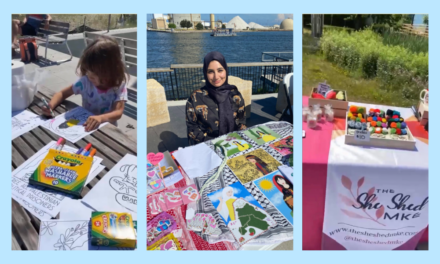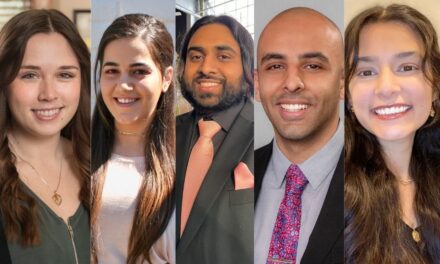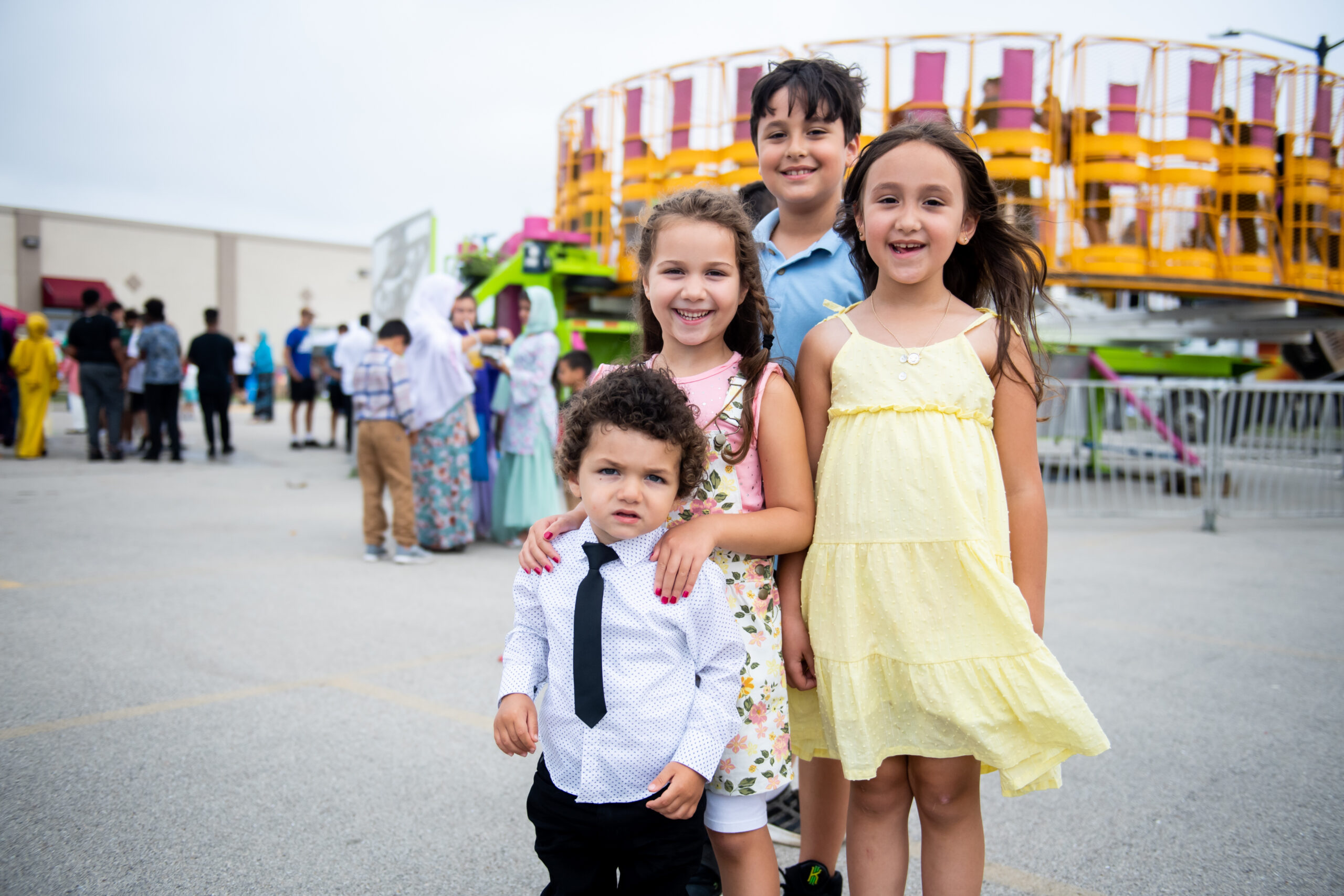
Many Milwaukee Muslim families celebrate the Eid together at the annual festival at the Islamic Society of Milwaukee.
Muslim immigrants and their American children “increasingly live in different cultural worlds,” says research published in the Encyclopedia on Early Childhood Development. “As a result, immigrant parents and children increasingly live in different cultural worlds.” This cultural gap can make family communication and mutual understanding difficult, and can lead to family conflict.
Milwaukee Muslim Women’s Coalitions’ culturally specific domestic violence program Our Peaceful Home is helping parents address this issue through parenting education. OPH aims to strengthen families through education, said OPH founder and MMWC president Janan Najeeb.
Its recent two-part series, “Strengthening the Muslim Parent: How to Bridge the Cultural Ties with your American Muslim Children,” appeared on Facebook Live in December. It features Rohingya and Arab America experts, speaking in their native languages. (See the first program in Rohingya language and English here and Wisconsin Muslim Journal’s report on its highlights.)
In today’s article, WMJ reports on a discussion in Arabic and English between Najeeb and Iman Saymeh, M.Ed., M.S.W., a clinical social worker and mental health coach who works at Georgetown University as a chaplain in residence. She previously served as a public and private school teacher and principal.
See their full Arabic-English discussion here.
Here are the highlights of the talk with Iman Saymeh, M.Ed., M.S.W.
How can parents help their child develop a strong sense of identity when the children are influenced by two cultures?
We must have open communication with our kids, and we must learn to show them respect as we want them to show respect to us. That will strengthen the ground that they are standing on.
It is definitely important to be proud of their culture but also what about parents incorporating aspects of American culture into their family life?
Parents should have a flexible mindset. Remember the reason that made you come and live in this country. Find what is good.
Social media is a mixed bag. Some aspects, like access to information, are great. But there are also dangers. What do you recommend to parents about dealing with platforms like Facebook, Instagram and the like?
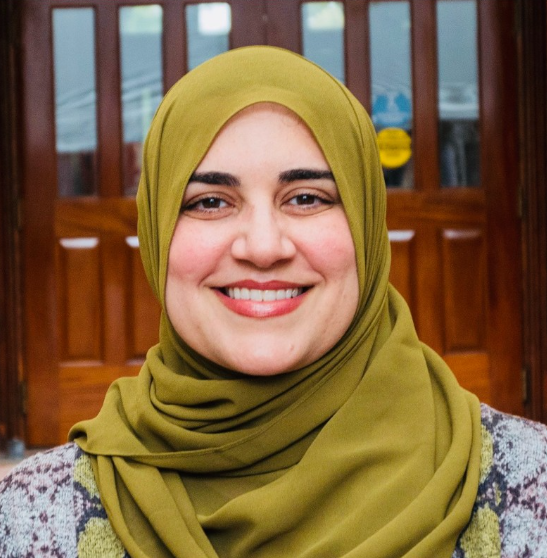
Iman Saymeh, M.Ed., MSW
Parents need to know they cannot trust their children to make good decisions about how they use social media without any supervision. It is not their fault. The prefrontal cortex is not fully grown until about the age of 25. That’s the part of the brain responsible for reasoning and making good decisions. Also, teenagers from the age of about 12 to 25 are experimenting. Parents need to understand their children do not yet have the tools to make good decisions on their own. If they don’t have a good, solid relationship with their parents, the guidance they receive will come from outside the home.
First, the home needs to be a place where they can come ask questions and seek guidance. It’s very important to build those relationships, to build those bonds, and to do family activities, to bring the kids together with the family.
Then we can teach the kids how to manage their accounts. Who are the people they should follow, and who are the people that it is not best for them to follow. They will watch things; they are curious. We need to teach them our values and create an atmosphere where they can talk about what they are seeing. We can set rules and regulations, and be watchful.
Sometimes the community doesn’t understand the value of Our Peaceful Home, our culturally specific domestic violence program. Can you speak to its importance in relation to parenting?
The services provide a safe haven for families going through domestic violence cases. It helps heal kids for many years to come. When there are problems in the family, sometimes children don’t get the attention they need. When they don’t, they may seek to fill the void with drugs and deal with the pain in negative ways. They may suffer depression, anxiety, or eating disorders. Those issues don’t come out of nowhere. Broken families break us—and I’m not talking about cases of divorce. When children or teens go through these issues, instead of putting all the blame on that teenager and pointing fingers, we need to stop and consider what has happened to them.
This question came in from a viewer, how do you start to mend the trauma and difficulties a family has experienced after years of dysfunction? How do you start to repair?
If there is flexibility and a willingness to do bridge building, there may be an opportunity to do therapy. Sometimes having a third party come in to help us address what has happened can be helpful. But you have to be ready to listen without judgment and take full responsibility. To mend things, the heart is soft and has remorse. There is an intention to restore things.
For some parents, it’s hard to admit fault. We need to humble our hearts and come to the table ready to apologize. We need to really hear what our children are going through and what they are missing.
Sometimes parents must peel away culture and strengthen our parenting style with Islamic understanding. What did the prophet teach us? What did he model for us?
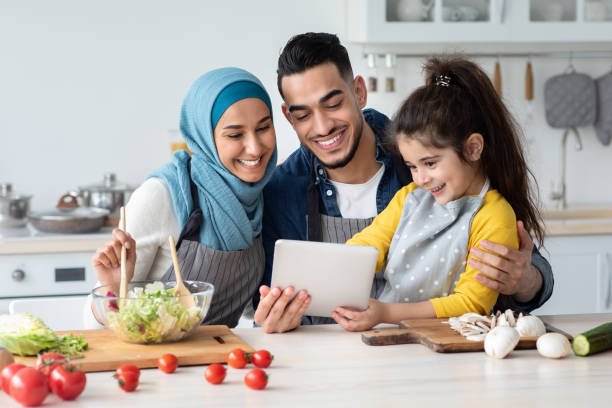
We are hearing more about the impact of adverse childhood experiences. Please explain how ACEs impact children.
We see it in schools, in children’s performance in their homework, their ability to make an oral presentation, to have friends and demonstrate social skills. To help them, we need to understand what is happening at home, what issues need to be resolved.
Presence is really nice, intimate setting in intimate connecting relationships.
When there is abuse in a home, whether physical or emotional or psychological, at what point is it healthier for a family to be apart? When do you try to keep a family together?
Often there is pressure from the community to stay together. We are responsible for our own wellbeing. It takes courage to face the issue.
We need to understand our limitations as a community. It can be healthy to seek a professional therapist to see if we can work out issues. Sometimes a therapist working with a couple can help them change the dynamic of the family.
It’s really beautiful work that can happen in the presence of a professional third party who would be able to hear and listen to things differently, and guide you through tools. Couple’s work is not always walk in the park but as long as people are showing up and they’re willing, and there is the flexibility to work on things, they will see the shift in themself and in their homes.
How can people dealing with addictions—not only drugs, but pornography, gambling, alcohol—what steps can they take to change their situation?
There is much to be said about this topic and we can’t address it all here. At the root of addictions is the idea that I’m not good enough. That’s the root of the pain.
Sometimes parents have modeled addictive behavior and, even after they quit, it stays with the kids. Sometimes the influences come from being in the wrong crowd. Every case is different. We need to expect that our children will make mistakes. They are curious.
As parents, you have to learn to address the issue the right way. Don’t put all the blame on the child. You might find yourself reacting in the moment. Learn to calm yourself and control your emotions. You must model what you want them to learn. They made a mistake; there are consequences. But what’s at the root of it? We need to really engage with the kids to understand where it is coming from.
Are there red flags parents can watch with their children?
When they act with disrespect, try to find out where this behavior is coming from. What is shifting? Who are they hanging out with? How is school for them? What is going on in their lives? Engage with your children in a relaxed atmosphere. Get to know their friends. Enter their world.
Who is responsible for healing our childhood traumas?
Healing is your responsibility. You must want to heal. You must want to choose something better for yourself. Nobody’s perfect. Our parents are not perfect. They’re doing their best, and sometimes they don’t do their best. But whatever happens, the aftermath is your responsibility to deal with.
And I ask you not to point fingers. That will take a lot of energy from you moving forward. What they were not able to give you, you give yourself. There’s a process in therapy called “reparenting yourself.” You give yourself what wasn’t given.
What are your thoughts about “deadbeat dads” who don’t financially support their children if they divorce their mothers?
Every penny we spend on our kids is a good deed. How beautiful is that? Every time we spend money on our kids, it cleanses our money and increases it. No money will be lessened. It is your responsibility as a father to spend on your kids.
You are going to be asked about them on the day of judgment how you earned your money and how you spent your money?


